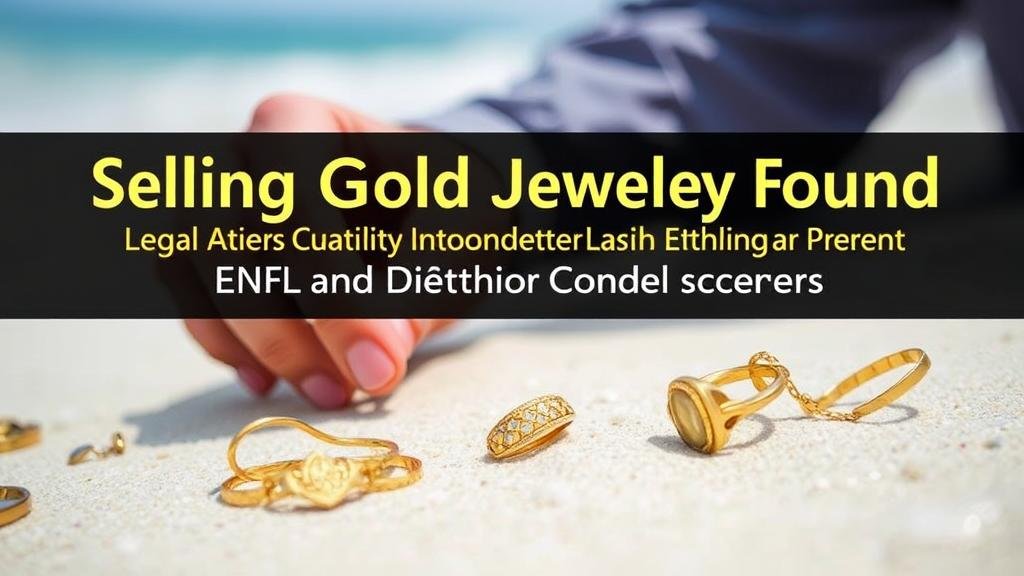Selling Gold Jewelry Found on Beaches: Legal and Ethical Considerations
Selling Gold Jewelry Found on Beaches: Legal and Ethical Considerations
Finding gold jewelry on beaches can be an exhilarating experience, dipping into a treasure hunt where the unexpected augments the thrill of the day. But, the allure of selling such finds comes with its own set of legal and ethical considerations that must be navigated carefully.
Understanding Ownership and Legal Rights
The foremost question upon discovering gold jewelry on a beach is: who owns it? The legal aspects of such finds vary significantly based on jurisdiction, and understanding local laws plays a critical role in ensuring compliance.
- Treasure Trove Laws: Many areas have established laws regarding treasure troves. For example, in the United States, laws differ across states; some states require that any found goods with high value be reported to local authorities. If a claim is established, the finder may be awarded a portion of the value.
- Public vs. Private Beaches: Ownership also depends on whether the beach is public or private. Generally, if a beach is public, the items found may belong to the finder. But, private beaches may have restrictions, and the original owner could be reclaiming property.
- Good Faith and Efforts to Locate Owners: Ethically, individuals should make reasonable efforts to find the original owner before taking actions to sell the jewelry. This may include reporting the find to local law enforcement or posting on community boards.
For example, a case in California involved a diver who found a significant amount of gold coins while searching on a beach known for historical shipwrecks. The local authorities confirmed that the coins were part of a larger treasure trove that belonged to the state, emphasizing the importance of researching laws before proceeding with sales.
Disclosing Finds and Selling Procedures
Once an individual understands their legal rights regarding ownership, the next step is evaluating how to sell the jewelry legally and ethically. Transparency is paramount in ensuring a smooth transaction.
- Documentation: Having documentation that details where and how the jewelry was found can be beneficial. This might include photographs of the find and any reports made to authorities. Such evidence can reassure potential buyers of the legitimacy of the item.
- Selling Channels: Consider legal selling channels such as jeweler shops, online marketplaces, or through auctions. Each platform has its own rules and regulations about selling found objects, and adhering to these ensures compliance and ethical practice.
For example, online platforms like eBay and Etsy allow for the sale of items with full transparency regarding their origin. The sellers are encouraged to provide a detailed description, which not only boosts credibility but also addresses ethical considerations by informing potential buyers about the jewelry’s finds.
Ethical Considerations in Selling Found Jewelry
Ethics play a crucial role in the determination of how found jewelry should be treated. Navigating ethical waters ensures that the finder respects the shared community and cultural significance of the jewelry.
- Cultural Heritage: Some found items, especially those of historical or cultural significance, may belong to specific communities or hold cultural value beyond monetary worth. Efforts to research the provenance of the jewelry can inform decisions about returning it to rightful custodians.
- Community Relations: Engaging with local community groups, especially those involved with beach clean-ups or heritage preservation, can lead to responsible decisions regarding found jewelry that honor local history.
For example, a situation arose where a beachcomber found ancient rings that were believed to belong to a local tribe. Rather than selling them, the finder reached out to community leaders and returned the rings, which fostered goodwill and support for preservation efforts.
Conclusion: Navigating the Landscape of Beach Finds
While finding gold jewelry on a beach may ignite a sense of excitement, its imperative to approach the prospect of selling these items with a clear understanding of legal rights and ethical obligations. By following local laws, maintaining transparency in sales, and respecting cultural heritage, collectors and finders can ensure that their actions are both lawful and ethically sound.
Actionable Takeaways:
- Research local laws regarding found property to identify ownership rights.
- Document the find thoroughly and communicate details honestly to potential buyers.
- Engage with local communities when historical or significant items are uncovered.
By keeping these considerations in mind, individuals can navigate the complexities of selling found gold jewelry responsibly and ethically.



